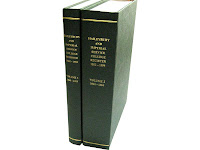Increased printing costs and the advent of computers may well have killed off the School Register. Many schools produced them, lists of former pupils listing their achievements at school together with their achievements in later life. For the collector of ephemera the older editions can be a fascinating read. Haileybury's latest register goes up to 1994 but even then concerns of cost cut out most of the interesting details of the older generations and the lengthy historical introduction - the first of which, by LS Milford, is an outstanding history of the first forty years of the life of the school. As a result the Eleventh Haileybury and ISC Register, put together with indefatigable energy by Bill Tyrwhitt-Drake (BF 1940), though full of interest for later generations, is a relatively dry volume for the older entries.
FW Bourdillion (E 1865) was a writer and poet who came from a significant Haileybury family. He wrote a poem on Registers in a volume called
Sursum Corda published in 1893. You can read the whole book online
here, but this is the poem.
A Public School Register
As birds of passage on some mid-sea isle,
From diverse lands and bound on diverse ways,
In company assembled for a while,
Then lose each other in the ocean haze:
So are we parted when are done the days
Of our brief brotherhood within this pile;
The world grows wider then; new hopes beguile;
And from new lips we look for blame or praise.
No lifeless page is this that bears enrolled
Names once familiar, and bids reappear
Forgotten faces. One has climbed to fame
In law or letters; one proved greatly bold
In battle; one—it may be the most dear—
Just does his life's work well and is the same.
By the way, if you want a copy of the register - you know you
need it - you can get one from the Society by clicking
here.








